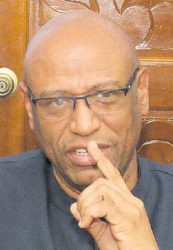In an era when governments in the Caribbean are actively wooing foreign private investment without so much as an opposing murmur from the governed, opposition to takeover of state entities by either local or foreign private investors has the support of the most powerful trade union in Trinidad and Tobago.
Last week Oilfields Workers’ Trade Union (OWTU) President General Ancel Roget attracted a fair measure of media attention when he used his address to an event held to mark the Union’s 80th anniversary

to discourage multinational companies from seeking to take over local state enterprises through privatization.
The union boss said in his presentation that the OWTU’s position on privatization of state entities had remained unchanged from almost four decades ago when it spearheaded a regimen of agitation for the expulsion of Texaco from the country’s oil and gas industry. In his address Roget said that his union had now shifted attention from expatriate entities to local businesses bent on emulating foreign investors.
Established in 1937 the OWTU, which represents workers in the state-run oil and gas sector, is regarded as the most powerful trade union in the country.
Seemingly invoking the pro nationalization economic doctrine that obtained under the Forbes Burnham administration in Guyana during the decade of the 1970s, Roget used his address to remind trade union colleagues of the struggles to take control of the commanding heights of the economy.
The veteran trade unionist refuted the views of local analysts who contend that the best prescription for modern Trinidad and Tobago is the privatization of state entities. He contended that the commanding heights of the country’s economy having passed from the hands of foreign investors into local ones, the latter had “made a mess of it.” He said that those in power had now given up and believe that the only solution is privatization though he warned that the disposal of state assets was unlikely to redound to the benefit of the citizenry.
Ironically, in Guyana, which, under Burnham had for years stood firm on the matter of state ownership, the present focus of the coalition party in power and led by Burnham’s People’s National Congress is on creating conditions convivial to private investment. Apart from a bauxite industry that has changed hands on more than one occasion, several other state entities including some in the forestry sector are now in private hands. Public discourse about the future of the country’s tottering sugar industry includes recently reported interest in the acquisition of all or part of its assets by an Indian company.
While there has been no major anti-privatization lobby from the local trade union movement individual trades unions as well as the Guyana Trades Union Congress have pointed to what they believe have been some of the downsides of foreign investment in local companies, particularly in the bauxite and forestry sectors where private investors have not only not taken kindly to trade union representation for workers but have also violated workers’ rights and shown less than high regard for workplace safety and environmental conditions. Countries like Guyana with badly underperforming state entities are known to be vulnerable to foreign investors with bailout plans that include financing for weak infrastructure and markets for product. The downside in many instances, however, has included employment cutbacks and less pleasing conditions of service. There has been evidence, too, of reluctance on the part of government to intervene to check investor workplace excesses.




